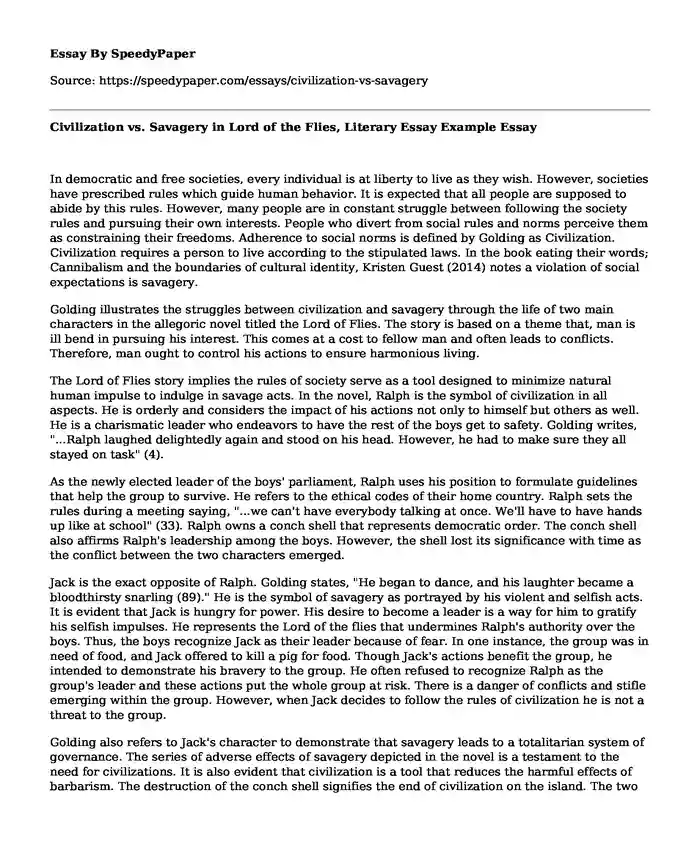
| Type of paper: | Essay |
| Categories: | English literature Lord of The Flies |
| Pages: | 3 |
| Wordcount: | 711 words |
In democratic and free societies, every individual is at liberty to live as they wish. However, societies have prescribed rules which guide human behavior. It is expected that all people are supposed to abide by this rules. However, many people are in constant struggle between following the society rules and pursuing their own interests. People who divert from social rules and norms perceive them as constraining their freedoms. Adherence to social norms is defined by Golding as Civilization. Civilization requires a person to live according to the stipulated laws. In the book eating their words; Cannibalism and the boundaries of cultural identity, Kristen Guest (2014) notes a violation of social expectations is savagery.
Golding illustrates the struggles between civilization and savagery through the life of two main characters in the allegoric novel titled the Lord of Flies. The story is based on a theme that, man is ill bend in pursuing his interest. This comes at a cost to fellow man and often leads to conflicts. Therefore, man ought to control his actions to ensure harmonious living.
The Lord of Flies story implies the rules of society serve as a tool designed to minimize natural human impulse to indulge in savage acts. In the novel, Ralph is the symbol of civilization in all aspects. He is orderly and considers the impact of his actions not only to himself but others as well. He is a charismatic leader who endeavors to have the rest of the boys get to safety. Golding writes, "...Ralph laughed delightedly again and stood on his head. However, he had to make sure they all stayed on task" (4).
As the newly elected leader of the boys' parliament, Ralph uses his position to formulate guidelines that help the group to survive. He refers to the ethical codes of their home country. Ralph sets the rules during a meeting saying, "...we can't have everybody talking at once. We'll have to have hands up like at school" (33). Ralph owns a conch shell that represents democratic order. The conch shell also affirms Ralph's leadership among the boys. However, the shell lost its significance with time as the conflict between the two characters emerged.
Jack is the exact opposite of Ralph. Golding states, "He began to dance, and his laughter became a bloodthirsty snarling (89)." He is the symbol of savagery as portrayed by his violent and selfish acts. It is evident that Jack is hungry for power. His desire to become a leader is a way for him to gratify his selfish impulses. He represents the Lord of the flies that undermines Ralph's authority over the boys. Thus, the boys recognize Jack as their leader because of fear. In one instance, the group was in need of food, and Jack offered to kill a pig for food. Though Jack's actions benefit the group, he intended to demonstrate his bravery to the group. He often refused to recognize Ralph as the group's leader and these actions put the whole group at risk. There is a danger of conflicts and stifle emerging within the group. However, when Jack decides to follow the rules of civilization he is not a threat to the group.
Golding also refers to Jack's character to demonstrate that savagery leads to a totalitarian system of governance. The series of adverse effects of savagery depicted in the novel is a testament to the need for civilizations. It is also evident that civilization is a tool that reduces the harmful effects of barbarism. The destruction of the conch shell signifies the end of civilization on the island. The two characters are the perfect demonstration of the effects of civilization and savagery.
Weckbecker (2014) writes, "Golding does a masterful job in contrasting the two lifestyles." Unfortunately, a majority of communities have individuals who display savagery instead of civilization. Addressing competing interest among people requires sobriety and observance of the rule of law. Savagery can only breed conflicts and social disorder.
References
Golding, W. (1999). Lord of the flies. New York, N.Y.: Penguin Books.
Kilgour. (2014). Eating their words: Cannibalism and the boundaries of cultural identity. Albany: State University of New York Press.
Weckbecker, L. (2014). Governing visions of the real: The National Film Unit and Griersonian Documentary Film in Aotearoa/New Zealand. Bristol, United Kingdom: Intellect.
Cite this page
Civilization vs. Savagery in Lord of the Flies, Literary Essay Example. (2022, Mar 02). Retrieved from https://speedypaper.net/essays/civilization-vs-savagery
Request Removal
If you are the original author of this essay and no longer wish to have it published on the SpeedyPaper website, please click below to request its removal:
- Free Essay: Risks and Returns Questions
- Oedipus Complex and the Powder - Comparison Essay Sample
- Essay Example on Street Gangs Recruitment and How It Mirrors Terrorist Recruitment
- Free Essay with the Article Review: Grammar Puss by Steven Pinker
- Business Essay Example: Components of a New Venture
- Essay Sample on Developing of the Quick App Marketing App
- Essay Example: Gratitude and Contentment With Life
Popular categories




